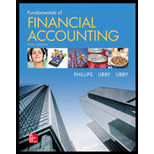
Fundamentals of Financial Accounting
5th Edition
ISBN: 9780078025914
Author: Fred Phillips Associate Professor, Robert Libby, Patricia Libby
Publisher: McGraw-Hill Education
expand_more
expand_more
format_list_bulleted
Concept explainers
Question
Chapter 6, Problem 5MC
To determine
The accounts that would have a debit balance.
Expert Solution & Answer
Want to see the full answer?
Check out a sample textbook solution
Students have asked these similar questions
How much is the company's predetermined overhead rate to the nearest cent?
Help with accounting question
I am searching for the accurate solution to this general accounting problem with the right approach.
Chapter 6 Solutions
Fundamentals of Financial Accounting
Ch. 6 - Prob. 1QCh. 6 - If a Chicago-based company ships goods on...Ch. 6 - Define goods available for sale. How does it...Ch. 6 - Define beginning inventory and ending inventory.Ch. 6 - Describe how transportation costs to obtain...Ch. 6 - What is the main distinction between perpetual and...Ch. 6 - Why is a physical count of inventory necessary in...Ch. 6 - What is the difference between FOB shipping point...Ch. 6 - Describe in words the journal entries that are...Ch. 6 - What is the distinction between Sales Returns and...
Ch. 6 - Prob. 11QCh. 6 - In response to the weak economy, your companys...Ch. 6 - Prob. 13QCh. 6 - Why are contra-revenue accounts used rather than...Ch. 6 - What is gross profit? How is the gross profit...Ch. 6 - Prob. 1MCCh. 6 - Prob. 2MCCh. 6 - Prob. 3MCCh. 6 - Prob. 4MCCh. 6 - Prob. 5MCCh. 6 - Prob. 6MCCh. 6 - Prob. 7MCCh. 6 - Prob. 8MCCh. 6 - Prob. 9MCCh. 6 - Prob. 10MCCh. 6 - Distinguishing among Operating Cycles Identify the...Ch. 6 - Calculating Shrinkage in a Perpetual Inventory...Ch. 6 - Prob. 6.3MECh. 6 - Inferring Purchases Using the Cost of Goods Sold...Ch. 6 - Evaluating Inventory Cost Components Assume...Ch. 6 - Prob. 6.6MECh. 6 - Recording Journal Entries for Purchases and Safes...Ch. 6 - Prob. 6.8MECh. 6 - Recording Journal Entries for Sales and Sales...Ch. 6 - Prob. 6.10MECh. 6 - Prob. 6.11MECh. 6 - Calculating Shrinkage and Gross Profit in a...Ch. 6 - Preparing a Multistep Income Statement Sellall...Ch. 6 - Prob. 6.14MECh. 6 - Computing and Interpreting the Gross Profit...Ch. 6 - Interpreting Changes in Gross Profit Percentage...Ch. 6 - Prob. 6.17MECh. 6 - Understanding Relationships among Gross Profit and...Ch. 6 - Relating Financial Statement Reporting to Type of...Ch. 6 - Prob. 6.2ECh. 6 - Identifying Shrinkage and Other Missing inventory...Ch. 6 - Prob. 6.4ECh. 6 - Prob. 6.5ECh. 6 - Inferring Missing Amounts Based on Income...Ch. 6 - Prob. 6.7ECh. 6 - Prob. 6.8ECh. 6 - Reporting Purchases, Purchase Discounts, and...Ch. 6 - Prob. 6.10ECh. 6 - Items Included in Inventory PC Mall, Inc., is a...Ch. 6 - Prob. 6.12ECh. 6 - Prob. 6.13ECh. 6 - Reporting Net Sales with Credit Sales and Sales...Ch. 6 - Prob. 6.15ECh. 6 - Prob. 6.16ECh. 6 - Prob. 6.17ECh. 6 - Determining the Effects of Credit Sales, Sales...Ch. 6 - Prob. 6.19ECh. 6 - Inferring Missing Amounts Based on Income...Ch. 6 - Prob. 6.21ECh. 6 - Prob. 6.22ECh. 6 - (Supplement 6A) Recording Purchases and Sales...Ch. 6 - Prob. 6.1CPCh. 6 - Prob. 6.2CPCh. 6 - Prob. 6.3CPCh. 6 - Prob. 6.4CPCh. 6 - (Supplement A) Recording Inventory Transactions...Ch. 6 - Prob. 6.1PACh. 6 - Reporting Purchase Transactions between Wholesale...Ch. 6 - Recording Sales with Discounts and Returns and...Ch. 6 - Prob. 6.4PACh. 6 - (Supplement A) Recording Inventory Transactions...Ch. 6 - Prob. 6.1PBCh. 6 - Reporting Purchase Transactions between Wholesale...Ch. 6 - Prob. 6.3PBCh. 6 - Prob. 6.4PBCh. 6 - (Supplement A) Recording Inventory Transactions...Ch. 6 - Accounting for Inventory Orders, Purchases, Sales,...Ch. 6 - Prob. 6.1SDCCh. 6 - Prob. 6.2SDCCh. 6 - Internet-Based Team Research: Examining an Annual...Ch. 6 - Evaluating the Results of Merchandising Operations...Ch. 6 - Prob. 6.6SDCCh. 6 - Prob. 6.1CC
Knowledge Booster
Learn more about
Need a deep-dive on the concept behind this application? Look no further. Learn more about this topic, accounting and related others by exploring similar questions and additional content below.Similar questions
- Please explain the correct approach for solving this general accounting question.arrow_forwardPlease provide the accurate answer to this general accounting problem using valid techniques.arrow_forwardI am trying to find the accurate solution to this general accounting problem with the correct explanation.arrow_forward
- Provide answerarrow_forwardVincent Manufacturing charges $75 per hour for labor and has a 35% material loading charge. A recent job required 24 hours and $2,200 of materials. Calculate the total cost of the job. a. $2,250 b. $3,150 c. $4,770 d. $3,900 helparrow_forwardWhat is the budgeted manufacturing overhead for March?arrow_forward
arrow_back_ios
SEE MORE QUESTIONS
arrow_forward_ios
Recommended textbooks for you
- Principles of Accounting Volume 1AccountingISBN:9781947172685Author:OpenStaxPublisher:OpenStax College
 College Accounting (Book Only): A Career ApproachAccountingISBN:9781337280570Author:Scott, Cathy J.Publisher:South-Western College Pub
College Accounting (Book Only): A Career ApproachAccountingISBN:9781337280570Author:Scott, Cathy J.Publisher:South-Western College Pub College Accounting, Chapters 1-27AccountingISBN:9781337794756Author:HEINTZ, James A.Publisher:Cengage Learning,
College Accounting, Chapters 1-27AccountingISBN:9781337794756Author:HEINTZ, James A.Publisher:Cengage Learning,  Cornerstones of Financial AccountingAccountingISBN:9781337690881Author:Jay Rich, Jeff JonesPublisher:Cengage Learning
Cornerstones of Financial AccountingAccountingISBN:9781337690881Author:Jay Rich, Jeff JonesPublisher:Cengage Learning Auditing: A Risk Based-Approach (MindTap Course L...AccountingISBN:9781337619455Author:Karla M Johnstone, Audrey A. Gramling, Larry E. RittenbergPublisher:Cengage Learning
Auditing: A Risk Based-Approach (MindTap Course L...AccountingISBN:9781337619455Author:Karla M Johnstone, Audrey A. Gramling, Larry E. RittenbergPublisher:Cengage Learning

Principles of Accounting Volume 1
Accounting
ISBN:9781947172685
Author:OpenStax
Publisher:OpenStax College

College Accounting (Book Only): A Career Approach
Accounting
ISBN:9781337280570
Author:Scott, Cathy J.
Publisher:South-Western College Pub

College Accounting, Chapters 1-27
Accounting
ISBN:9781337794756
Author:HEINTZ, James A.
Publisher:Cengage Learning,

Cornerstones of Financial Accounting
Accounting
ISBN:9781337690881
Author:Jay Rich, Jeff Jones
Publisher:Cengage Learning

Auditing: A Risk Based-Approach (MindTap Course L...
Accounting
ISBN:9781337619455
Author:Karla M Johnstone, Audrey A. Gramling, Larry E. Rittenberg
Publisher:Cengage Learning

ACCOUNTING BASICS: Debits and Credits Explained; Author: Accounting Stuff;https://www.youtube.com/watch?v=VhwZ9t2b3Zk;License: Standard Youtube License